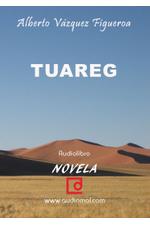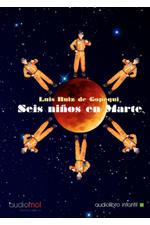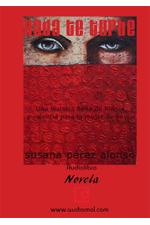Blog del Instituto Cervantes de Dublín
Torre Martello
Audiolibro de la semana | Audiobook of the Week: Dos madres, la historia de una familia casi feliz
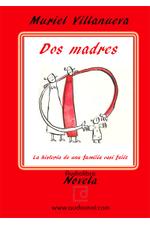 Esta semana te traemos una bonita historia en forma de audiolibro, Dos madres, la historia de una familia casi feliz de la escritora Muriel Villanueva. Las instrucciones para la descarga son muy sencillas: coge tu carnet de socio de la biblioteca y pulsa aquí.
Esta semana te traemos una bonita historia en forma de audiolibro, Dos madres, la historia de una familia casi feliz de la escritora Muriel Villanueva. Las instrucciones para la descarga son muy sencillas: coge tu carnet de socio de la biblioteca y pulsa aquí.
Es este un texto breve, intenso y emotivo, que cuenta la historia de una niña que creció al lado de su madre biológica y de su pareja, también mujer. Para no herir la sensibilidad de su familia, la autora ha preferido convertir este texto en una novela, pero ahí está su experiencia real, que arranca el día de la boda de sus ‘madres’ y luego camina hacia atrás en el tiempo, hasta llegar al día que que las dos mujeres se conocieron y la madre de Muriel decidió hablar con su marido para contarle la nueva experiencia y despedirse de él.
This week we bring you a beautiful story in the form of an audiobook, Dos madres, la historia de una familia casi feliz by Muriel Villanueva. The instructions to download it are very simple: take your library card and click here.
This is a short, intense and touching novel that tells us the story of a girl who grew up with her biological mother and her partner, also a woman. In order not to offend the sensibilities of her family, the author has decided to turn her real experience into fiction. The story begins with her mothers’ wedding day and goes back in time until the day the two women met each other and Muriel’s mother decided to talk to her husband to tell him the news and say good-bye to him.
Audiolibro de la semana | Audiobook of the Week: Tuareg
¿Te apetece trasladarte a miles de kilómetros y vivir aventuras apasionantes? Lo tienes muy fácil con el audiolibro que te recomendamos esta semana, Tuareg de Alberto Vázquez Figueroa. La descarga es tan sencilla como coger tu tarjeta de biblioteca y pulsar aquí.
Los tuareg constituyen un pueblo altivo cuyo código moral difiere del de los árabes. Auténticos hijos del desierto, los tuareg no tienen rival en cuanto a sobrevivir en las condiciones más adversas. El noble inmouchar Gacel Sayah, protagonista de esta novela, es amo absoluto de una infinita extensión de desierto. Cierto día llegan al campamento dos fugitivos procedentes del norte, y el inmouchar, fiel a las multiseculares y sagradas leyes de la hospitalidad, los acoge. Sin embargo, Gacel ignora que esas mismas leyes le arrastrarán a una aventura mortal… Una apasionante epopeya que es a la vez un canto a uno de los pueblos más singulares del mundo.
Would you like to travel thousands of kilometres and live exciting adventures? You have it easy with the audiobook that we recommend you this week: Tuareg by Alberto Vázquez Figueroa. To download it just take your library card and click here.
Tuaregs are the true sons of the desert; able to survive like no others can, in the harshest of conditions. The noble inmouchar Gacel Sayah, presides over a huge corner of the desert. One day, two fugitives arrive from the north and Gacel, in accordance with their ancient and sacred hospitality laws, gives them shelter. At the time, Gacel is unaware that this act of kindness will lead to a series of deadly adventures… A classic epic and at the same time a beautiful rendition to one of the world’s most unique cultures.
Audiolibro de la semana | Audiobook of the Week: Parpadeos
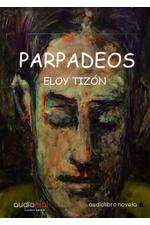 Para empezar bien el fin de semana te traemos el audiolibro Parpadeos de Eloy Tizón. La descarga es tan simple como coger tu carnet de biblioteca y pulsar aquí.
Para empezar bien el fin de semana te traemos el audiolibro Parpadeos de Eloy Tizón. La descarga es tan simple como coger tu carnet de biblioteca y pulsar aquí.
En una milésima de segundo puede uno alcanzar la riqueza o arruinarse, ganar o perder, enamorarse o dejar de amar… o puede contar un cuento. El parpadeo es la posibilidad microscópica de un cambio. Este libro reúne trece historias cotidianas y a la vez excepcionales, procedentes del mundo de la imaginación, de los sueños, de la literatura, de viajes a través del espacio y el tiempo –al futuro o al pasado–, donde lo usual se transfigura en imprevisto y, por ejemplo, los pájaros lloran, los peces vuelan, los gatos calzan botas, los robots sufren como personas, los fantasmas se pasean por la calle, en el descansillo de la escalera aparece con toda naturalidad un león suelto, y un simple trayecto en ascensor puede convertirse en umbral de una experiencia peligrosa.
Eloy Tizón escribe trece miniaturas sobre las que derrama su mirada lírica, intensa, compasiva y secretamente maliciosa: parpadeante.
You can start this weekend with a good plan, you can listen to our recommended audiobook of the week: Parpadeos by Eloy Tizón. The download is very simple, you only have to take your library card and click on this link.
In the thousandth of a second you can reach wealth or poverty, you can win or lose, you can fall in love or stop loving someone…Or you can also tell a story. Blinking is the microscopic possibility of a change. This book compiles thirteen stories of the everyday world that are extraordinary at the same time. They come from the world of imagination, dreams and travel literature going through space and time -future or past- where the usual turns into the unexpected and for example: birds cry, fishes fly, cats wear boots, robots suffer as people do, ghosts walk in the streets, you can find a lion in a corridor and being in an elevator can become a dangerous experience.
Eloy Tizón writes thirteen miniatures where he places his liryc, intense, compassionate and secretly mischievous look: blinking.
Audiolibro de la semana | Audiobook of the Week: Kafka y la muñeca viajera
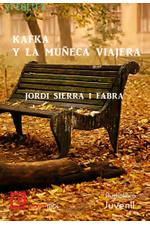 Esta semana os traemos el audiolibro Kafka y la muñeca viajera del versátil y prolífico escritor Jordi Sierra i Fabra. Para descargarte esta conmovedora historia solo hay que seguir dos pasos: coger tu carnet de la biblioteca y pulsar en el enlace.
Esta semana os traemos el audiolibro Kafka y la muñeca viajera del versátil y prolífico escritor Jordi Sierra i Fabra. Para descargarte esta conmovedora historia solo hay que seguir dos pasos: coger tu carnet de la biblioteca y pulsar en el enlace.
Un año antes de su muerte, Franz Kafka vivió una experiencia muy insólita. Paseando por el parque Steglitz, en Berlín, encontró a una niña llorando desconsolada: había perdido su muñeca. Para calmar a la pequeña, el autor de La metamorfosis se inventó una peculiar historia: la muñeca no se había perdido, se había ido de viaje, y él, convertido en cartero de muñecas, tenía una carta que le llevaría al día siguiente al parque. Aquella noche Franz escribió la primera de las muchas cartas que, durante tres semanas, entregó a la niña puntualmente, narrando las peripecias de la extraordinaria muñeca desde todos los rincones del mundo.
Según cuenta Dora Dymant, su compañera en aquellos días, el estado febril con el que Kafka escribía esas cartas era comparable al de cualquiera de sus inmortales obras. Éste es el relato de aquella experiencia, en la que Franz Kafka fue un mago de la palabra para una niña desconocida de la que jamás volvió a saberse nada, como tampoco de aquellas cartas que constituyen uno de los misterios más hermosos de la narrativa del siglo XX.
This week we bring you the audiobook Kafka y la muñeca viajera by the versatile and prolific writer Jordi Sierra i Fabra. To download this touching story you have to follow only two steps: take your library card and click here.
The year before his death, Franz Kafka lived a very unusual experience. He was taking a walk in the Steglitz Park in Berlin where he found a girl crying inconsolably: she had lost her doll. The author of The Metamorphosis made up a peculiar story: the doll wasn´t lost, she went for a travel and he, as a postman for dolls, had a letter that he would bring her to the park the next day. That night he wrote the first of the many letters that he would give to the girl punctually for three weeks, narrating the adventures of this extraordinary doll from all over the world.
According to Dora Dymant, his partner back then, the hectic mood that Kafka experienced while he wrote those letters was comparable to the one he felt when he wrote any of his immortal works. This is the story of that experience in which Franz Kafka was a magician of words for an unknown girl. It remains a mystery what happened to that girl or to those letters that are one of the most beautiful secrets of the 20th century narrative.
Audiolibro de la semana | Audiobook of the Week: Seis niños en Marte
El audiolibro de esta semana es Seis niños en Marte, un emocionante libro para niños de Luis Ruiz de Gopegui. La descarga de este audiolibro es tan sencilla como tener un carnet válido de la biblioteca y pulsar aquí.
Este es un libro muy especial y muy espacial, ya que toda la acción transcurre en el espacio y además los protagonistas son solo niños. Pero no son niños a lomos de una vaca con alas ni sufren pesadillas producidas por una indigestión de melocotones porque su autor, Luis Ruiz de Gopegui, es un científico.
Este es su primer libro dedicado a los niños y en él nos cuenta todo lo que razonablemente habría que hacer para llegar al planeta Marte. Luis lo sabe bien porque siguió desde la estación espacial dela NASA en España las operaciones que hicieron posible la llegada del hombre a la Luna.
The audiobook of the week is Seis niños en Marte, an exciting children´s book by Luis Ruiz de Gopegui. To download this audiobook you need a valid library card and click here.
This is a very special and very spatial book as all action happens in Space and furthermore the characters are children. But they are not children riding a cow with wings and they don´t have tummy ache because they ate too many peaches as the author, Luis Ruiz de Gopegui is a scientist.
This is his first book dedicated to children and he tells us what you can reasonably do to go to Mars. Luis knows this well, as he followed closely the operations from the NASA Space Station in Spain when the man first arrived to the moon.
Audiolibro de la semana | Audiobook of the Week: Astur
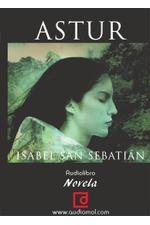 Novela histórica para amenizar vuestro fin de semana con Astur de Isabel San Sebastián. Descargar este audiolibro es muy fácil, solo necesitáis vuestro carnet de biblioteca y hacer clic en el siguiente enlace.
Novela histórica para amenizar vuestro fin de semana con Astur de Isabel San Sebastián. Descargar este audiolibro es muy fácil, solo necesitáis vuestro carnet de biblioteca y hacer clic en el siguiente enlace.
En los albores del siglo VIII, la sacerdotisa del castro de Coaña da a luz a una niña en una noche sin luna. Una profecía y una maldición sellarán el futuro de Huma, poseedora de un don tan poderoso como aterrador. Al sur, en Recópolis, la gran ciudad fundada por Leovigildo, ocupada por los guerreros de Alá, el joven de estirpe goda Ickila es castigado al destierro y decide buscar fortuna en Asturias, el único territorio que aún resiste al poder de Al Ándalus.Los destinos de Huma e Ickila se entrelazan aún a su pesar movidos por una fuerza ancestral que les arrastra.
Isabel San Sebastián es la creadora de Astur, novela que la consagra como narradora y creadora de una saga de hombres y mujeres míticos, en la que épica, leyenda e Historia se dan la mano para conducir al lector al corazón de un tiempo apasionante.
This week we have chosen the historical novel Astur by Isabel San Sebastián to live up your weekend. To download this audiobook just get your library card and click here.
In the dawn of the 8th century, the priestess of the Coaña fort gives birth to a girl in a night with no moon. A prophecy and a curse will determine Huma´s future. She has a powerful and terrifying gift. Down South, in Recopolis, the great city founded by Leovigildo and occupied by the warriors of Allah, the young Goth Ickila is sent into exile and he decides to seek fortune in Asturias, the only land that still resists the power of Al Andalus. The destinies of Huma and Ickila intertwine in spite of themselves as there is an ancestral force which drags them.
Isabel San Sebastián is the creator of Astur, a novel that establish her as narrator and creator of a dinasty of mythical women and men where epic, legend and history link together taking the reader to the heart of a thrilling time.
Presentación de libro | Book Launch: Forked Tongues. Poetas gallegas, vascas y catalanas traducidas por poetas de Irlanda
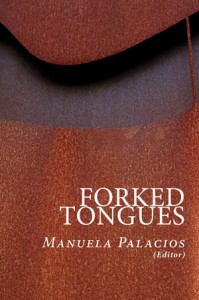 Terminamos el mes con la presentación del libro Forked Tongues, una antología editada por Manuela Palacios de poemas de poetas gallegas, vascas y gallegas traducidas al inglés por poetas irlandesas. Te esperamos hoy a las 18:00 en el Café Literario.
Terminamos el mes con la presentación del libro Forked Tongues, una antología editada por Manuela Palacios de poemas de poetas gallegas, vascas y gallegas traducidas al inglés por poetas irlandesas. Te esperamos hoy a las 18:00 en el Café Literario.
Irlanda ha sido con frecuencia fuente de inspiración para Galicia, el País Vasco y Cataluña bien sea por razones políticas, sociales o culturales. Esta antología lleva a cabo un diálogo intercultural que redefine y fortalece los lazos literarios entre estas comunidades. Poetas de Irlanda recrean en inglés los poemas de una selección de las poetas actuales más destacadas en Galicia, el País Vasco y Cataluña. Juntos enriquecen la escena literaria europea al celebrar su diversidad.
Editada por Manuela Palacios y publicada por Shearsman, la antología Forked Tongues incluye poemas de Pilar Pallarés, Chus Pato, Lupe Gómez Arto, Yolanda Castaño, María do Cebreiro (Galicia); Itxaro Borda, Miren Agur Meabe, Castillo Suárez, Leire Bilbao (País Vasco); Vinyet Panyella, Susanna Rafart, Gemma Gorga, Mireia Calafell (Cataluña).
Traducciones de Maurice Harmon, Lorna Shaughnessy, Anne Le Marquand Hartigan, Máighréad Medbh, Mary O’Donnell, Celia de Fréine, Catherine Phil MacCarthy, Susan Connolly, Paddy Bushe, Michael O’Loughlin, Paula Meehan, Keith Payne, Theo Dorgan, con el asesoramiento de Kirsty Hooper, Diana Cullell y Juan Arana-Cobos.
Se servirá vino español.
February ends with the book lauch of Forked Tongues, an anthology edited by Manuela Palacios. It consists of a selection of poems written by Galician, Basque and Catalan poets translated into English by Irish poets. We hope to see you today at 6pm at Café Literario.
Galicia, the Basque country and Catalonia have often found in Ireland an “inspiring Other” whether for political, social or cultural reasons. This anthology engages in an intercultural dialogue which redefines and strengthens the literary bonds among these communities. A selection of the most prominent Galician, Basque and Catalan contemporary women poets have their verse recreated in English by Irish writers. Together they enrich the European literary scene by celebrating its diversity.
Edited by Manuela Palacios and published by Shearsman, Forked Tongues features work by Pilar Pallarés, Chus Pato, Lupe Gómez Arto, Yolanda Castaño, María do Cebreiro (Galicia); Itxaro Borda, Miren Agur Meabe, Castillo Suárez, Leire Bilbao (Basque Country); Vinyet Panyella, Susanna Rafart, Gemma Gorga, Mireia Calafell (Catalonia).
Translations by: Maurice Harmon, Lorna Shaughnessy, Anne Le Marquand Hartigan, Máighréad Medbh, Mary O’Donnell, Celia de Fréine, Catherine Phil MacCarthy, Susan Connolly, Paddy Bushe, Michael O’Loughlin, Paula Meehan, Keith Payne, Theo Dorgan. Translation drafts by Kirsty Hooper, Diana Cullell and Juan Arana-Cobos.
Spanish wine will be served.
Nuestro primer libro electrónico: Biblioteca Literaria 2013 | Our first e-book: Literary Library 2013
Biblioteca Literaria 2013 es un libro electrónico bilingüe, español–inglés, que contiene dieciséis de las entrevistas y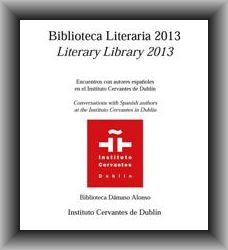 encuentros digitales que se realizaron en la Biblioteca Dámaso Alonso con dieciséis de los escritores que visitaron el centro durante 2011.
encuentros digitales que se realizaron en la Biblioteca Dámaso Alonso con dieciséis de los escritores que visitaron el centro durante 2011.
Su formato ePub permite la lectura tanto en la pantalla del ordenador, como en cualquier otro dispositivo móvil. Biblioteca Literaria 2013 también está disponible en la biblioteca digital del Instituto Cervantes.
Sinopsis: ¿Era Dalí un fraude?, ¿qué es la literatura fantástica?, ¿qué tienen en común perros, águilas y caballos?… En Biblioteca literaria 2013 encontrarás la respuesta a estas y muchas otras preguntas, al tiempo que conocerás un poco mejor a dieciséis autores clave de la literatura actual en español.
Biblioteca literaria 2013 te ofrece dieciséis entrevistas y encuentros digitales, en edición bilingüe español; inglés, con otros tantos escritores españoles que pasaron por el Instituto Cervantes de Dublín para hablarnos de libros propios y ajenos. Biblioteca Literaria 2013 contiene conversaciones con Javier Barreiro, Yolanda Castaño, Anamaría Crowe Serrano, Juan Cruz, Luis Alberto de Cuenca, Rafael Escuredo, Cristina Fernández Cubas, Laura Freixas, Luis García Montero, Almudena Grandes, Alicia Mariño, David Roas, Jesús Ruiz Mantilla, Diego Valverde Villena, Manuel Vicent y Alfonso Zapico.
En estas conversaciones se tratan temas tan diversos como la literatura fantástica, la creación poética, la literatura escrita por mujeres, la novela gráfica, o la obra de autores como Mario Vargas Llosa, Carmen Martín Gaite, James Joyce y Bram Stoker.
Además, el libro ofrece también acceso a entrevistas en video con estos escritores y a otros enlaces recomendados que servirán de guía al lector que desee profundizar en el conocimiento de un determinado autor.
Literary Library 2013 is a bilingual Spanish-English e-book containing sixteen interviews and digital meetings that took place at the Damaso Alonso Library with sixteen Spanish writers who visited us during 2011.
Its ePub format allows reading both in the computer screen, as in any other mobile device. Literary Library 2013 is also available at the digital library of the Instituto Cervantes.
Synopsis: Was Dalí a fraud?, what is Fantastic literature?, what do dogs, eagles and horses have in common ? In Library literary 2013 you will find the answer to these and many other questions, while you learn more about sixteen key authors of Spanish literature.
Literary Library 2013 contains talks with Javier Barreiro, Yolanda Brown, Anamaria Crowe Serrano, Juan Cruz, Luis Alberto de Cuenca, Rafael Escuredo, Cristina Fernández Cubas, Laura Freixas, Luis García Montero, Almudena Grandes, Alicia Marino, David Roas, Jesús Ruiz Mantilla , Diego Valverde Villena, Manuel Vicent and Alfonso Zapico.
In these conversations we cover topics as diverse as Fantastic literature, poetic creation, women’s literature, graphic novel, or the work of authors such as Mario Vargas Llosa, Carmen Martín Gaite, James Joyce or Bram Stoker.
In addition, the book also offers access to video interviews with these writers and other recommended links that will guide the reader who wishes to deepen the knowledge of a particular author.
Audiolibro de la semana | Audiobook of the Week: Citas en Manhattan
El audiolibro de la semana es Citas en Manhattan de Emma Reverter, periodista catalana afincada en Nueva York. Para descargar esta divertida reflexión sobre la dificultad de las relaciones de pareja, haz click aquí.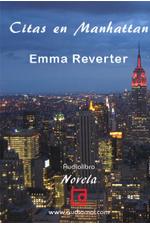
Victoria Sachs es una atractiva e inteligente periodista, especializada en política internacional que vive en Manhattan. Con la llegada del calor recibe el encargo de escribir una columna ligera para el suplemento veraniego de su periódico y, al no ser su especialidad, tiene miedo de fracasar. Victoria investigará y compartirá con los lectores las novedosas posibilidades que ofrece el mercado para encontrar a nuestra media naranja. Citas en Manhattan es una novela ácida, divertida e inteligente sobre el mundo de las citas en Nueva York, una tendencia que se ha convertido en un auténtico fenómeno social.
The audiobook of the week is Citas en Manhattan by Emma Reverter, a Catalan journalist who resides in New York. To download this funny reflection about relationships, click here.
Victoria Sachs is an attractive and intelligent journalist living in Manhattan and specialized in international politics. As summer approaches, she gets the assignment of writing a light column for the summer supplement of her newspaper. It is not her speciality and she´s afraid of failing. Victoria will research and share with the readers the different possibilities offered in the market to find our better half. Citas in Manhattan is a witty, funny and smart novel about the dating world in New York, a trend that has become a social phenomenon.
Audiolibro de la semana | Audiobook of the Week: Nada te turbe
El audiolibro de esta semana es uno de los éxitos más inesperados de los últimos años. Se trata de Nada te turbe de Susana Pérez-Alonso. Para descargarte esta historia que te enganchará desde el primer momento solo necesitas dos cosas: tu carnet de la biblioteca y hacer click aquí.
“Nada te turbe” es el propósito que una mañana se hace Catalina Béjar de Prado. Ella, Catalina y sus amigas son las protagonistas de esta novela. Catalina Béjar de Prado es una mujer progresista hasta donde le conviene. Catalina Béjar de Prado se casó con un “igual”, eso es lo que ella creía. En el fondo, Catalina se casó para escapar. Nunca supo de qué tenía que escapar, pero ese fue su propósito. Ahora, en la cuarentena, Catalina se nota permanentemente turbada y no escatima esfuerzos para dejar de estar así. El problema es su casa, su hija, su marido, su trabajo, su madre, su hermana, sus amigas, el amante, la mujer del amante, la política, la globalización, la anorexia, los gimnasios, el magnesio…
The audiobook of the week was one of the most unexpected successes of the last few years. It´s the novel Nada te turbe by Susana Pérez-Alonso. To download this engaging story you just need two things: your library card and make click here.
“Let nothing disturb you” is the resolution made one morning by Catalina Béjar de Prado. Catalina and her friends are the main characters of this novel. Catalina Béjar de Prado is a liberal woman to a certain point. She got married to someone “like her”, that´s what she thought. Deep down, Catalina got married in order to escape. She never knew exactly what she was escaping from but that was the purpose. Now that she is in her forties Catalina finds herself permanently distraught and she spares no effort to stop feeling like that. The problem is her home, her daughter, her husband, her job, her mother, her sister, her friends, her lover, her lover´s wife, politics, globalization, anorexia, gyms, magnesium…
[Video] Entrevista a Ángel Guinda / Interview with Ángel Guinda
Ángel Guinda (Zaragoza, 26 de agosto de 1948) ofreció una charla en el Instituto Cervantes de Dublín el pasado 22 de octubre: Poesía útil: lectura comentada. Nuestra compañera Carmen Sanjulián lo entrevistó con motivo de su visita a nuestro centro. Edición de video: Cris Méndez.
Ángel Guinda es un escritor español conocido sobre todo por su poesía, aunque su obra abarca géneros muy variados: artículos en periódicos y revistas, ensayos y traducciones.
Fundó la Colección Puyal de libros de poesía en 1977 y la revista Malvís en 1988. Ha publicado más de una veintena de libros y es coautor de la letra del Himno de Aragón. En 2010 fue galardonado con el Premio de las Letras Aragonesas.
El Instituto Cervantes de Dublín y la editorial Olifante ofrecieron este recital poético del autor español Ángel Guinda, quién mostró una proyección de videoclips sobre su poética (Arquitextura) y Manifiestos (Poesía útil, Antimanifiesto, Manifiesto No) además de videopoemas. A los audiovisuales les seguió una lectura comentada por el propio autor y un coloquio. Presentó y conversó con el autor Jennifer Wood (NUI Maynooth)
Instituto Cervantes Dublin and Olifante Publishing House are delighted to present this poetry recital by Spanish author Ángel Guinda. He screened a series of video clips about his poetry (“Arquitextura”) and Manifestos (“Poesía útil”, “Antimanifiesto”, “Manifiesto No”) as well as video poems. The videos were followed by a recital with comments by the author and a Q&A session. Introuced by Jennifer Wood (NUI Maytnooth)
Ángel Guinda (Zaragoza, August 26th, 1948) is a Spanish writer known mainly for his poetry, although his work extends to various genres: newspaper and magazine articles, essays and translations.
He founded the Colección Puyal of poetry books in 1977 and the Malvís magazine in 1988. He has published over twenty books and is the co-author of the lyrics to the Aragón anthem. In 2010 he received the award Premio de Letras Aragonesas.
Audiolibro de la semana | Audiobook of the Week: Asuntos propios
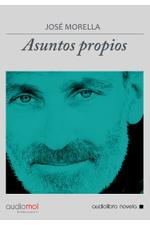 Asuntos propios de José Morella es el audiolibro propuesto esta semana. Descargarlo es tan fácil como coger tu carnet de biblioteca y hacer click aquí.
Asuntos propios de José Morella es el audiolibro propuesto esta semana. Descargarlo es tan fácil como coger tu carnet de biblioteca y hacer click aquí.
Roberto es un hombre acostumbrado a hacer lo que le da la gana. Un hombre independiente. Se jubiló hace seis años, pero, a sus setenta y un años, sigue traduciendo. Y cada mañana se sienta delante del ordenador, y traduce durante horas. La señora Dolores, la portera, sube a limpiar el piso un par de veces por semana pero cuando sufre una embolia y ya no puede volver a trabajar, Isabel, la hija de Roberto, insiste en que su padre pida una asistenta.
Un lunes, Jacinta llama a la puerta. Su belleza y su carácter impresionan a Roberto, y enseguida surge algo entre ellos. Entre esa mujer, que sabe que siempre será una extranjera que genera una sorda desconfianza entre los locales, y ese hombre culto, aún ávido de vida, surge una relación que subvierte sus vidas y las de los que les rodean.
Porque su goce suscita odios y revela prejuicios que nadie cree tener, pone en cuestión el limbo terrible al que los hijos condenan a los padres, los jóvenes a los viejos, los iguales a los diferentes. Una elegante, sagaz fábula de la cotidianeidad, llena de inesperadas facetas a descubrir.
This week we suggest you Asuntos propios by José Morella. Downloading this audiobook is as easy as taking you library card and making click here.
Roberto is someone who is used to do whatever he wants. An independent man. He´s been retired for six years but even though he´s 71 years old, he still translates every day for hours.
Ms Dolores, the caretaker, cleans up his apartment twice a week but when he suffers an embolism and cannot work anymore, Isabel, Roberto´s daughter, wants his father to get someone who looks after him.
One day, Jacinta knocks on the door. Her beauty and personality impress Roberto and there is an instant connection between them. A relationship is born between Jacinta, who knows that she always will be a foreigner and locals won´t trust her, and Roberto who is an educated man, still eager for life. This relationship changes their lives and the lives of those who surround them.
Their joy arouses hatred and reveals prejudices that everybody thinks they don´t have. It calls into question the terrible limbo where children condemn their parents, young people to old people,similar people to different people. This is an elegant, sharp fable of everyday life, full of unexpected sides to discover.
Cine | Film screening: Ninette
 Una vez más José Luis Garci entra en el escenario teatral para mirarlo a través de la cámara de cine. En esta ocasión lo hace con la visión romántica y divertida que requiere una comedia como Ninette. El Café Literario abre hoy sus puertas a las 18:00 horas para ofrecerte esta divertida y entrañable película.
Una vez más José Luis Garci entra en el escenario teatral para mirarlo a través de la cámara de cine. En esta ocasión lo hace con la visión romántica y divertida que requiere una comedia como Ninette. El Café Literario abre hoy sus puertas a las 18:00 horas para ofrecerte esta divertida y entrañable película.
Ninette es la refundición y adaptación cinematográfica de las dos obras (Ninette y un señor de Murcia y Ninette, Modas de París) que Mihura dedicó a su personaje preferido, la inteligente, sexy, graciosa y espontánea muchacha parisina que trabaja en las Galerías Lafayette y que, a partir de ahora, siempre recordaremos con la sonrisa y figura de Elsa Pataky. La película Ninette, producida por Níkel Odeon y PC29, es el homenaje que Garci ofrece en su escenario a Miguel Mihura (1905-2005), uno de los máximos humoristas y dramaturgos del siglo XX.
Ninette Sánchez (Elsa Pataky), hija de emigrantes españoles en Francia, es una inteligente, sexy, graciosa y espontánea muchacha parisina que trabaja en las Galerías Lafayette. Con su naturalidad y belleza tiene enamorado a Andrés (Carlos Hipólito), un provinciano que no puede resistirse a sus encantos…
Once again José Luis Garci enters the theatre and looks at it through the film camera. On this occasion he does this from the romantic, amusing view point which a comedy such as Ninette requires. Café Literario opens today at 6pm to show this delightful and touching movie.
Ninette is a reworking and film adaptation of two works (Ninette and the Gentleman from Murcia and Ninette, Paris Fashions) which Mihura dedicated to his favourite character, the intelligent, sexy, amusing and spontaneous Parisian girl who works in Galerias Lafayette and who, from now on, will always be remembered with the smile and figure of Elsa Pataky. The film Ninette, produced by Nikel Odeon and PC29 is Garci´s homage to Miguel Mihura (1905-2005) one of the greatest humourists and dramatists of the twentieth century.
Ninette Sánchez (Elsa Pataky), daughter of Spanish immigrants in France, is an intelligent, sexy, amusing and spontaneous Parisian girl who works at Galleries Lafayette. Her natural manner and beauty have a great impact on Andrés (Carlos Hipólito), a countryside guy who cannot resist Ninnete´s charm…
Autor del mes | Author of the month: Luis Alberto de Cuenca
Luis Alberto de Cuenca es nuestro autor seleccionado para los meses de diciembre y enero. Nació en Madrid en 1950 y es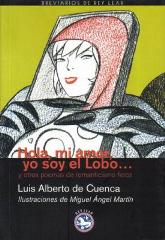 autor de una numerosa producción como poeta, traductor y ensayista. Empezó la carrera de Derecho pero pronto la abandonó para licenciarse en Filología Clásica. Posteriormente obtuvo el doctorado y ha ocupado cargos tan destacados como el de Secretario de Estado de Cultura y director de la Biblioteca Nacional.
autor de una numerosa producción como poeta, traductor y ensayista. Empezó la carrera de Derecho pero pronto la abandonó para licenciarse en Filología Clásica. Posteriormente obtuvo el doctorado y ha ocupado cargos tan destacados como el de Secretario de Estado de Cultura y director de la Biblioteca Nacional.
Es uno de los poetas contemporáneos más destacados del panorama nacional, alternando formas clásicas y modernas dentro de un estilo muy personal que le ha valido el reconocimiento de la crítica especializada. Su obra poética se inicia en 1971 con Los retratos y prosigue con Elsinore, Scholia y Necrofilia, en la línea de la poesía culturalista.
La ironía, el lenguaje coloquial, el distanciamiento, o la mezcla de lo cotidiano y lo irreal, son rasgos perceptibles a partir de La caja de plata, que obtuvo el Premio de la Crítica en 1986.
Luis Alberto de Cuenca is the author of the month in December and January. He was born in Madrid in 1950 and is the author of a vast production as poet, translator and essayist. He started to study Law but soon he dropped out and he graduated in Classical Philology. He later obtained a PhD and he was Estate Secretary of the Ministry of Culture and Director of the National Library.
He is one of the most remarkable poets in the national scene, combining classic and modern forms. His unique style has received critical recognition. His poetic work started in 1971 with Los retratos and continued with Elsinore,Scholia and Necrofilia, which are part of the so called Culturalist Poetry.
Irony, colloquial language, distancing, the everyday and the transcendental intermingling are elements of his poems since La caja de plata which won the Critics Award in 1986.
Audiolibro de la semana | Audiobook of the Week: El caldero de oro
El audiolibro que te proponemos esta semana es El caldero de oro de José María Merino. Si deseas descargártelo, solo necesitas dos cosas: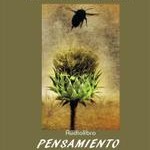 tener a mano tu carnet de biblioteca y hacer click aquí.
tener a mano tu carnet de biblioteca y hacer click aquí.
Es esta novela, el relato de un tiempo mítico que reúne en sí el pasado y el presente, marcado por las invasiones y los olvidos, origen y testigo de las vidas de quienes lo poblaron desde su principio. El caldero de oro será el símbolo de las estirpes que vivieron junto al río milenario, leyenda fundacional, símbolo insoslayable de la infancia de un protagonista que, un día, regresará al pueblo de sus antepasados, abandonado y solitario, para encontrase con un destino encerrado en su propia historia.
Narrada desde la memoria y la imaginación sustentada en un lenguaje que no olvida nunca su condición reveladora, El caldero de oro es una de las obras que evidencian la renovada vitalidad de la literatura española.
The audiobook of this week is El caldero de oro by José María Merino. If you wish to download it, you just need to follow two steps: take your library card and make click here.
This is a story about a mythical time that links past and present, a time marked by invasions and obscurity that is origin and witness of the lives who inhabited it since the beginning. The golden caldron is symbol of the lineage that lived next to the thousand-year-old river. It´s the original legend, the inescapable symbol of the main character´s childhood who one day comes back to the abandoned and lonely village where his ancestors lived to meet a destiny locked in its own history.
This story is told from the memory and imagination and it´s nurtured by a language that never forgets its revealing condition. El caldero de oro is one of the novels that show the renewed vitality of Spanish literature.
